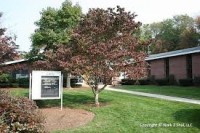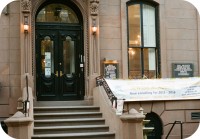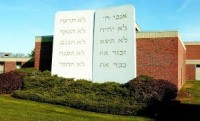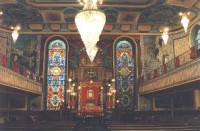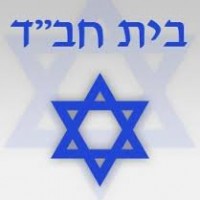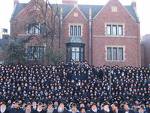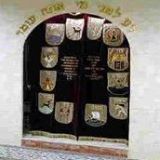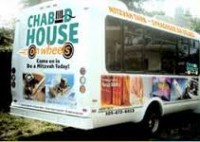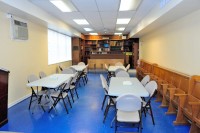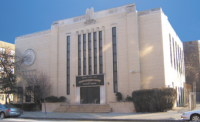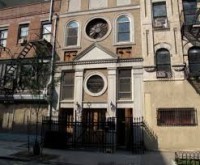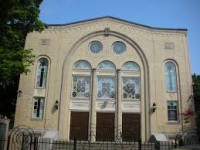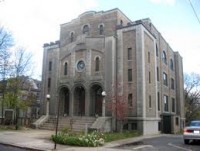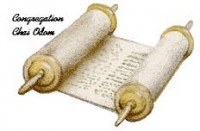The Young Israel of Sharon is a vibrant orthodox shul with a warm friendly, and relaxed atmosphere. Our ideology is inclusiveness. The Young Israel of Sharon brings together men, women, and children from a wide variety of backgrounds, with a broad array of religious styles and approaches, all unified by a commitment to authentic Torah life and spirit.
Young Israel of Sharon opened its doors in 1972 with just a minyan of families. In 2001, Young Israel moved to its present day facility. Today, we are experiencing 10% annual growth and have currently reached about 200 member families.
A variety of reasons contribute to Young Israel's growth: our family-oriented community; safe neighborhood to raise kids; modern diversity and openness; and our young and vibrant members. Another reason is Sharon’s affordable housing. Business Week online listed Sharon, MA as one of the top 20 Best Affordable suburbs in the Northeast.
Young Israel exemplifies the ideals of Modern Orthodox: serious Torah study and practice, together with an embrace of diversity and participatory openness to the best of contemporary culture and community.
Rabbi Dr. Meir Sendor is the spiritual leader of the Young Israel of Sharon, MA.
He is a recognized scholar in the field of Jewish History, specifically the history of Jewish mysticism, philosophy and medicine. He holds a rabbinic ordination from Yeshiva University, a Ph.D. with Distinction from Harvard University and a Master’s from Yale University. Rabbi Sendor lectures widely on his specialties and holds many classes on various Torah topics for all levels.
Welcome to Congregation B’nai Avraham, the Orthodox synagogue in Brooklyn Heights. As the only Orthodox synagogue in the neighborhood, we serve a unique role in accommodating people with divergent religious backgrounds and at varying levels of observance. We welcome all!
Our goal is to increase the level of Jewish awareness, knowledge and observance by providing a warm, welcoming community with activities to appeal to people at all levels and with varying interests. We provide a daily morning and evening minyan and more than ten classes a week for adult learning, as well as beginner’s services and children’s services on Shabbat. Our Mei Menacham Mikvah is perhaps the most beautiful mikvah in the City.
Our membership includes both Ashkenazim and Sephardim, and our members’ first languages include Hebrew, Russian, Yiddush, French, Spanish and Arabic, as well as English. Our spiritual leader, Rabbi Aaron L. Raskin, is a member of the Chabad movement, and during services most people use the RCA ArtScroll Siddur and the Stone Chumash, although other Siddurim and Chumashim are readily available.
Come to Saturday services and enjoy a sociable kiddush afterwards, or stop by at one of our many classes, or come to a Friday night dinner with singing, joy and a guest speaker. Whether you are a yeshivah graduate, baal teshuvah, considering conversion or totally new to matters Jewish, we welcome you, and you will find a comfortable place in our vibrant community.
Daily Classes
There’s always something happening at B’nai Avraham! Every day of the week Jewish education classes are taught for free in English.
If you want to pursue your Jewish education, there are no more excuses. See our *list of classes* for more particulars. Don’t see your topic on the list? Ask us!
History
In the Summer of 1988 Stephen and Penny Rosen, having recently become more observant, wanted to establish an orthodox Shabbat minyan. Together, they contacted Rabbi Shimon Hecht of B’nai Jacob in Park Slope, who supplied them with a Torah scroll, books, and a very young man to lead services and read from the Torah. Space was rented from a local theater group, signs posted, calls made, and the hope was that someone would show up for the scheduled Rosh Hashanah and Yom Kippur services. Initially, there were the Rosens, Drs. Walter and Brenda Molofsky, previous members with the Rosens of a local Conservative Synagogue, the young man (Rabbi Aaron L. Raskin) and Rabbi Raskin’s brother Shua, who was recruited to walk from Crown Heights with the Rabbi.
Amazingly enough, other people came so that there was a minyan, and the first and only Orthodox Synagogue in Brooklyn Heights began.
After Yom Kippur, holiday and Saturday morning services were held at the Rosen’s residence for the next nine months. The Congregation was officially founded as a religious corporation in December 1988. It was named B’nai Avraham in honor of Stephen Rosen’s grandfathers, both of whom had the Hebrew name “Avraham.” Rabbi Raskin noted that “B’nai Avraham,” literally, “children of Abraham” is the name given to converts, and the Congregation has had many converts among its members. After nine months at the Rosens’, the Congregation rented a parlor floor apartment on Clinton Street. As the landlady lived upstairs, the front door had to remain locked. Generally, Stephen Rosen waited at the front door to let people in. Latecomers tossed pebbles against a window and someone would come down to let them in.
We then moved to a commercial space at 100 Clinton Street, where at long last, we could leave the door open. Finally, in 1996, we moved to our current location at 117 Remsen Street, purchased from the Brooklyn Heights Synagogue (Reform), which acquired a larger building three doors away.
In 2000, the Mei Menachem Community Mikvah was built. It is one of the most beautiful and elegant Mikvahs in the New York area.
Young Israel: Past, Present and Future
"The aims and purposes of the organization shall be to foster and maintain a program of spiritual, cultural, social and communal activity towards the advancement and perpetuation of traditional Torah-true Judaism; and to instill into American Jewish youth an understanding and appreciation of the high ethical and spiritual values of Judaism and demonstrate the compatibility of the ancient faith of Israel with good Americanism.
The organization shall promote cooperation among the constituent branches now existing and which may hereafter be formed, establish a close bond of kinship to the end that their individual and common problems may more easily be solved, and act as the federated and central body for the Young Israel Movement so that its influence as a force in Jewry may be felt and recognized in America and the world over."
(from the Preamble of the National Council of Young Israel Constitution)
Young Israel was born in 1912, when the primary aspirations of most American-born Jews were economic success and acceptance in American society. Jewish education was very low on their list of priorities, and as a result, was usually rudimentary, at best. Orthodox synagogues were exclusively Yiddish-speaking and permeated by an Eastern European atmosphere. American-raised Jewish youth who wandered into these synagogues typically found themselves shut out completely. It is not surprising that the Jewish youth of that era generally avoided the synagogue, attending only when expected by family custom. Although intermarriage was relatively rare, the distance between young Jewish hearts and minds and Jewish belief and practice was almost huge. It was in this environment that Young Israel was founded by a group of 15 visionary young men and women.
Its first activities were Friday night lectures in English (which was very controversial) on a variety of topics of Jewish interest. Three years later, the group formed a "Model Synagogue" with innovations designed to attract American-raised English-speaking Jewish youth, including participatory singing and youth programs. To enable people of all means to fully participate in synagogue services, Young Israel prohibited the auctioning of synagogue honors. The National Council of Young Israel required the minimum halachic standards of a mechitza, closed parking facilities on Shabbat and Yom Tov, and that each of its synagogues officers be Shomer Shabbat. Young Israel synagogues popped up across North America.
Young Israel envisioned itself as much more than a conglomeration of synagogues. Young Israel was the first on secular college campuses, with over 20 kosher dining halls and intercollegiate programs. Young Israel created an Employment Bureau for Sabbath Observers, in an era when most employees were expected to work 6 days a week. At Young Israel’s headquarters in New York, arms were packed for the Haganah defense forces of the not-yet-born State of Israel. The Free Soviet Jewry Movement was championed by the leadership of Young Israel. Young Israel has always been fiercely Zionistic, and promoted the rights of Jews to live throughout the Land of Israel. Young Israel placed an important role in gaining broad acceptance for advocating for the commuting of Jonathan Pollard’s sentence.
Today the National Council of Young Israel provides professional advice and cost-saving initiatives to 135 Young Israel synagogues (and beyond), advocates for the interests and views of our 25,000 member families, trains aspiring rabbis, supports rabbis in the field with biweekly question and answer sessions, aides communities in rabbinic searches and relations, coordinates informative Gabbai2Gabbai conference calls, provides exciting Parsha Nation curriculum for synagogue youth groups, runs inspiring Achva Summer Teen Experiences, shares best practices through monthly e-publications Shul Solutions and The Practical Pulpit, runs a three division basketball league in the New York metropolitan area, and serves as the sponsor of four senior centers at Young Israel synagogues which feed, educate and recreate the generation that made Young Israel great.
Future plans include providing spiritual inspiration and connection for Young Professionals and training Ashkenazic rabbis how to serve their Sephardic congregants. We are committed to work to maximize the resources of the Jewish community by working with our colleagues at other Jewish organizations and Jewish institutes of higher education and to maintaining a standard of excellence in everything we do.
Weekly Shiurim:
Rav Singer Chevra Mishnayos Shiur: Daily between Mincha & Maariv
Mishna Berura Yomis: Daily after Maariv
Daf Yomi by Rabbi Fishelis: Sun – Thu at 8:00 PM
Mishlei Shiur: Sunday mornings, 7:45 AM
Women's Shiur in Tehillim: Monday
Rabbi Romm's Ha'amek Davar Shiur for men and women: Wednesday at
9 PM
Torah Topics: given by Rabbi Mayer Friedman. Friday mornings, 9:15 – 10:15 AM
Shabbos Shiurim:
Rabbi Romm–1 hour before Mincha
Daf Yomi–1 hour before Mincha
The Bialystoker Synagogue was organized in 1865 on the Lower East Side of New York City. The Synagogue began on Hester Street, moved to Orchard Street, and then ultimately to its current location on Willet Street, more recently renamed Bialystoker Place.
Our congregation is housed in a fieldstone building built in 1826 in the late Federal style. The building is made of Manhattan schist from a quarry on nearby Pitt Street. The exterior is marked by three windows over three doors framed with round arches, a low flight of brownstone steps, a low pitched pedimented roof with a lunette window and a wooden cornice. It was first designed as the Willett Street Methodist Episcopal Church.
In the corner of the women’s gallery there is a small break in the wall that leads to a ladder going up to an attic, lit by two windows. Legend has it that the synagogue was a stop on the Underground Railroad and that runaway slaves found sanctuary in this attic.
In 1905, our congregation, at that time composed chiefly of Polish immigrants from the province of Bialystok, purchased the building to serve as our synagogue. During the Great Depression, a decision was made to beautify the main sanctuary, to provide a sense of hope and inspiration to the community. The synagogue was listed as a New York City landmark on April 19, 1966. It is one of only four early-19th century fieldstone religious buildings surviving from the late Federal period in Lower Manhattan. Richard McBee and Dodi-Lee Hecht have both written in-depth articles about the building.
In 1988 the Synagogue restored the interior to its original facade, and the former Hebrew school building was renovated and reopened as The Daniel Potkorony Building. It is currently used for many educational activities. Our most recent project was the refurbishing of our windows.
The Synagogue has continued to be a vibrant and reputable force in the religious world. In recent years a substantial number of new families have chosen to make it their place for prayer and study.
Park East Synagogue is dedicated to providing the opportunity for spiritual growth, Jewish education and spiritual comfort for individuals, families, and our community.
Park East Synagogue is inclusive of all people seeking a meaningful Jewish life, regardless of degree of observance, knowledge of Jewish tradition, age, or affiliation.
Park East Synagogue is committed to providing inspiring Jewish and general studies education to children and to adults; its Religious School, Early Childhood, and Day School with its emphasis on cultivating a Jewish life rich in tradition and unrivalled in general studies has been, and continues to be, a source of character and vitality for its congregation.
The synagogue’s influence, strength and dynamism in the community derive from the members of our congregation. We value and honor the role our congregants fulfill in defining and shaping our future and that of the Jewish community, in New York City and beyond.
Shacharit
February 28 at 9:00 am EST
February 29 at 7:45 am EST
March 1 at 7:45 am EST
Mincha
February 28 at 5:40 pm EST
February 29 at 5:40 pm EST
March 1 at 5:40 pm EST
I'm not going to leave a synagogue less than a five star but I'm a little confused why I was kicked off the steps of the back entrance. I have never seen anyone come in or go out that way. I'm Jewish. There are cameras everywhere and a Police station a few doors down. They are not paticularly comfortable steps to sit on. The reason I like to sit on those steps is because it's a temple and also because it's close to Police. A few criminals are paying people to harass me every day and when I'm on those steps is the only time they leave me alone. Thanks guys
Rabbi Shaya Gansbourg, OBM, was many things to many people. A husband, a father, a grandfather. A teacher, a mentor, a good friend. A rabbi, a businessman, a world traveler. But most of all, he was a unique, special and exceedingly selfless soul. Genuine, pure, and brimming with life, Shaya was never satisfied with the status quo. He thrived on making the impossible, possible; on reaching the unreachable; on bringing to fruition that which others said could not be done. Shaya was a master of accomplishment, because he was a master of his essence – his soul. He was fully cognizant of his mission on earth as a Jew, a Chassid, a human being par excellence.
For those who knew him, it came as no surprise when Shaya announced — mid-life, when most people his age are thinking about the not-too-distant retirement funds and long-awaited vacations — that he, together with his dear wife Goldie and family, may they be blessed with long and good years, will be embarking on one of the most important and meaningful projects of his life. And thus, in one courageous instance of hope and faith, Chabad of Harlem was born.
As the Founding Father, Shaya spared no effort building Chabad of Harlem, cultivating and nurturing all he encountered. He embraced every human being who walked through the doors with the same love and devotion that he bestowed upon his very own family. Because Chabad of Harlem was his family. And will always continue to be his family.
To know Chabad of Harlem, to be a part of Chabad of Harlem in any way at all – is to know Shaya and to be deeply connected to him. He touched, inspired, and guided. He rejoiced in every happy occasion and wept along in tragedy. He loved his community. And his soul will continue to do so forever, illuminating and brightening every future interaction and experience. His legacy lives on in the proud and beautiful community he built. May his soul be a blessing for all of us.
What is Chabad at Columbia University?
· Chabad at Columbia University is a meeting place for social, educational and cultural events; a place where students seek guidance and advice on whatever issues life presents.
· A partnership between students and faculty to help create innovative programming, plan social action projects, promote awareness activities and offer volunteer opportunities.
· A home where all are welcome no matter what background or affiliation.
· Like a home, our doors never close.
· A place where every Jew is family.
· A forum where students can question faith without fear of judgment.
· A haven to turn to when a student is stressed or lonely and needs a friend to talk to — at any time of day or night.
PHILOSOPHY
Chabad at Columbia University is based on the ideology of Chabad Chassidism, which has at its foundation the encompassing mitzvah ‘to love one’s fellow as one loves oneself’ and to permeate that love with Acts of Kindness and Mitzvahs. We tirelessly deliver a universal message:
Each person is invaluable and has a direct and powerful ability to bring wholeness and peace to the world.
Chabad at Columbia University seeks to engage students at their own pace and comfort level through innovative educational and cultural programs.
PROGRAMS & SERVICES
Chabad at Columbia University has developed a reputation as an innovator of distinctive educational and social action programming.
Additionally, creative hands-on programs on campus raise community awareness, consciousness and pride. Weekly classes are given on various topics such as Mysticism and Jewish law.
Community services and events such as an interest free small loan fund for students, lending library, food drives, elderly/infirm visitation, and more.
Of course, the Rabbi and Rebbetzin are available to meet with students individually around the clock.
FUNDING
As a student, community organization, we are committed to providing our programs and services free of charge. No one is ever turned away due to lack of funds. The support for our programs comes solely from alumni, parents and friends.
FAQ
Is what you think about Chabad MYTH or FACT? You may be surprised. Take a few minutes to browse through these FAQ and you'll have a better understanding of what Chabad is all about. Click here to read some of our FAQs
Chabad of the Upper East Side is part of a world-wide organazation of Chabad-Lubavitch, under the leadership and guidance of the Lubavitcher Rebbe, Rabbi Menachem Mendel Schneerson.
There is no mystery about our philosophy: Love every Jew; educate every Jew; reach out to help every Jew. We open our arms and hearts to all, regardless of education or affiliation. That is a commitment that we have honored on the Upper East Side since 1993
Synagogue
Friday Evening
Mincha & Maariv:
5 minutes after candle lighting
Shabbat
9:00 AM: Chassidic Philosophy
9:30 AM: Morning Services
10:30 AM: Reading of the Torah accompanied by penetrating Chassidic insights into the Torah and it's relevance to our personal lives
Kids Shul: 10:15 AM -12:15 PM
with Mrs. Rivkah Dayan
Followed by Kiddush
Mincha, Seuda Shlishit followed by
Evening services, Havdallah and The Living Torah.
Call for exact times.
Sunday & Legal Holidays
The Upper East Side Kollel
Learning: 8:30 AM
Morning Services: 9:00 AM
followed by breakfast and 1:1* learning until 1:30 PM
Monday-Friday
The Upper East Side Kollel
6:45 1:1 Learning
7:30 AM – Morning Services
followed by breakfast and 1:1* learning until 12:30 PM
Jewish Identity Grows On Manhattan's Upper East Side
Marlene Rosenberg, a successful senior business management consultant has been living around the corner from Chabad of the Upper East Side for as long as she can remember. But it was only in the past year that she took courage and ventured in gingerly, despite her fears that the experience would be too intimidating.
“Both my parents were Jewish, but we grew up with no real knowledge or Jewish traditions,” she said. “I didn’t read Hebrew, and knew nothing about how to participate at services.” When her sister died a year ago, the loss triggered a hunger, and Marlene was on a quest for something that would bring comfort and meaning to her life.
Of the estimated 56,000 Jews who live on Manhattan’s Upper East Side—the area bounded by the East River to Central Park and 59th Street to 96th Street—only 15,000 affiliate in some way.
“The UES has one of the wealthiest, most assimilated Jewish populations anywhere,” Rabbi Benzion Krasinianski, director with his wife Chanie, of Chabad of the UES, said. “But with this many Jews who don’t affiliate at all, the need and the possibilities are tremendous.” He recalls that when he moved to the area 21 years ago to establish Chabad of the UES, many thought he’d come to the wrong neighborhood.
“People told us frankly that they didn’t see how Chabad would be relevant to Jews here who have reached the summit of success in their careers; that they would have no interest in anything spiritual.” But some like Marlene, sensitive to an existential void that begs a different kind of answer, eventually find their way to Chabad of the UES on East 77th Street and First Avenue.
Others connect when they send their children to Chabad’s popular preschool which has grown to 75 children; or to its Hebrew School where at any given time, 50 adolescents are being prepared for their bar-bat mitzvahs.
Chabad facilities here include the $13 million Schneerson Center for Jewish Life sponsored by George Rohr & Family and the Jacques & Hanna Schwalbe Mikvah sponsored by Peter Schwalbe. The building, featuring a sanctuary, classrooms, commercial kitchen and social hall bookended by a beautiful, spa-like mikvah on its below-ground level that is used by 400 women a month, and an open-air playground on the roof, is bursting at the seams.
Peter Schwalbe recalls that when “we first started building about 12 years ago, I used to say to the rabbi: ‘What if we build this spectacular building and no one shows up?’” But they now have children on a waiting list for admission to the preschool because, he says, “there’s simply no room.”
The Krasinianskis, parents of a large family, deliver a standard of programming and services that often exceeds the expectations of Upper East Siders. “The Upper East Side is a trend setting community and has repercussions around the world. If mikvah is good enough for Park Avenue women, it must be good enough for everyone,” says Chanie.
Nicknamed 7:11 for opening its doors every morning shortly before 7 and closing at 11, the Chabad center sees hundreds of Jews on an average week and more than that participating in its varied and dispersed programs and services: besides the preschool and Hebrew school, it offers well attended adult education classes, a Kollel, daily prayer services, a Friendship Circle. Under the Krasinianski’s leadership, Chabad on the UES has opened Chabad of Hunter College, Chabad Israel Center of the UES, Chabad Young Professionals, and most recently, Chabad’s Medical Outreach program.
Owing to the largest concentration of world class hospitals, including Sloan Kettering, Columbia Presbyterian, Cornell, Lenox Hill, and Mt. Sinai, the Krasinianski’s recently decided to recruit a young couple dedicated to serving this sector.
“We are often called upon by people who end up here unexpectedly, traumatized by a sudden medical crisis. They need someone to turn to, to lean on, who can help them out with medical referrals, Shabbos accommodations, sometimes with language barriers.”
In addition, Chabad’s designer thrift shop, Solomon's Wive's Designer Resale & Thrift on East 89th Street, brings people together for a good cause. Managed by Donna Pressman, who helped Mussa Zakon set up the thrift shop, the store’s proceeds go to support Chabad’s educational and social activities. The shop, says Pressman, is “where we take the material and turn it into something spiritual.”
But above all, says Rabbi Krasinianski, Chabad is here to teach Torah. “There is a real thirst—even among a more traditional element—for Chasidic study. People come back because once they’ve been exposed to the inspiration and depth that Chabad Chasidism offers, they appreciate the difference it makes in their lives.”
Long-time supporter Deborah Aronow with her husband Joseph Aronow—who recently made a generous corporate grant towards lessonsintanya.com, an online Tanya class featuring daily Tanya sessions with Rabbi Krasinianski—has known the Krasinianskis since 1992.
Although she admits that she was one of those Upper East Siders who might have thought she’d have no need for Chabad, getting to know Chabad through the Krasinianskis, who are now “family,” has taught her the timeless relevance of Torah. “There was nothing like this when I was growing up. Chabad has brought light, learning and acceptance” to Jews on the UES. “It’s not an old-fashioned thing that doesn’t apply today. Everything that you experience with Chabad has an application today.”
On a December Friday night, some 55 people—all congregants of the Reform New York Shul led by Rabbi Burt Siegel joined Chabad for Shabbat dinner. None had ever been to Chabad before, and they were curious to participate at a traditional Shabbat dinner. After the dinner, Rabbi Krasinianski opened the floor to a “stump the rabbi” session.
“They had so many serious questions; they were so engaged and interested to know more about the Torah’s perspective on a wide gamut of issues. They stayed on for hours.”
Marlene’s first exposure to Chabad, she recalls, was disarming. “They greeted me so warmly and made me feel so welcome. I felt no pressure at all.” There was a first Passover Seder, and then the High Holidays was another first. Soon she was coming more frequently, and now she’s sharing with others her newfound sense of belonging, an inspired Jewish identity, and the rich Torah content that Chabad has introduced to her life. Today, she’s at Chabad every Shabbos and takes time off of work for the rabbi’s Wednesday class.
“It’s opened a whole new world to me, both intellectually and socially. I’ve made new friends here. I’ve truly fallen in love with what I found here at Chabad.”
When I visited the synagogue I was treated as if I was a member of the community, it was great to feel at home and not like a stranger. I recommend it to everyone whether orthodox, conservative or reform. The next time I visit miami this synagogue will definitely be my first choice.
Very kind, nice and welcoming. Make one feel right at home…whether welcoming Shabbat, conducting Mincha or down for the holidays.
Best Sephardic shul in Miami Beach !!!!
"I recommend it to everyone whether orthodox, conservative or reform."
We are so excited to be a part of The Shabbos Project this coming Shabbat. Jews all over the world are committing to keeping Shabbat together, and there are events taking place all over the world, including at Shaare Ezra.
This Friday night we will be hosting a community dinner and invite everyone to attend. Each adult is only $18 and children under 10 are free. Please encourage your friends to join you in keeping Shabbat this week as we participate in this powerful project.
Please contact the Shul office at 305-674-6690 to make your reservations for Friday night. We will also be having lunch on Saturday, so plan on joining us for a most meaningful Shabbat experience. If anyone is able to host guest in their house this Shabbat, please let us know so we can make arrangements for those coming in to keep Shabbat.
Women and girls over 10 years old, do not forget that Thursday night is the The Great Big Challah Bake, where thousands of women will be gathering to bake challah together at the Miami Beach Convention Center. Doors open at 6:00. Thanks to the generosity of a donor, this event is free.
Historic Shaare Zedek Synagogue
For over a century, Congregation Shaare Zedek has served the Orthodox Jewish community
of northern Hudson County in New Jersey, including West New York, Guttenberg, North Bergen, Weehawken and Union City.
In 2012 we celebrated our Centennial. Some of our families have been with us since the beginning over a hundred years ago.
If you are part of our history, we invite you to contribute your story to our virtual book.
If you are new to Shaare Zedek we welcome you with open arms.
The synagogue is temporarily closed while we fix some building code violations and settle some fines.
When we reopen, we have services on Shabbat at 9:30 AM, and also on Jewish holidays.
We often have maariv on Friday – call us to check on the status: (201) 867-6859
Start the year on a
HIGH note!
High Holiday Services at
Chabad House in Miami Beach
Rosh Hashana 5776 – 2015 – September 13 -15
Yom Kippur – Sept 22-23
Chabad invites you to a warm, traditional, uplifting, and meaningful High Holiday experience.
Our doors are open to all; no membership fees or tickets.
Warm, friendly and non-judgmental atmosphere
No background, affiliation or prior knowledge necessary.
Hebrew-English Holiday Prayer Books
Traditional services blended with contemporary messages
Prayer instructions throughout the service
Insights and explanations into the Prayers, practices and rituals and inspirational stories
Festive Holiday Meals
Reserve Now for Amazing Rosh Hashana Dinner
All services are free of charge Donations are encouraged and warmly appreciated
No tickets required. Reservations are appreciated for Services, required for Festive Holiday Meals.
Everyone is invited, and no one will be turned away for lack of funds. Main thing is you come, and we are waiting to see you!
We look forward to personally greeting you!
The Jewish Community Center – Chabad of West Queens
Mission Statement
To assist the residents of West Queens, achieve their spiritual, physical and emotional goals through exemplary educational, religious, cultural and social programming and celebration.
To provide support in times of need, illness or emergency
To promote and strengthen Jewish awareness, pride and identity to all Jewish individuals and families regardless of affiliation or background
To provide a warm community home where everyone is made to feel welcome & comfortable.
About our Center
The JCC – Chabad LIC was created with one goal in mind – to offer all Jews, even those with little or no background – a home, and an education and memories that will inspire them for a lifetime. We strive to evoke a sense of history, love for the land of Israel, and a genuine understanding of what Judaism is all about, and thereby develop strong Jewish pride.
Our center is founded on the principle that, while people embrace many levels of observance in their personal lives, there should be a place for no labels, and all affiliations. A place where people can develop a sense of community and enhance their own spiritual experiences of Judaism.
We realize that when it comes to spirituality, it is NOT "one size fits all." We have therefore created a multifaceted program with various sub organizational departments to cater to the different needs of the many parts which comprise a community.
Each department is managed by an individual of our staff that is fully dedicated to the development and expansion of that division. We aim to ensure maximum efficiency and quality of its programming so that everyone's needs can be catered to with the appropriate attention.
Whatever department you are involved with, the trademark feeling of warmth and creative spiritual excitement flows through every program. We provide everyone with a taste of joyful Judaism according to their own specific interests, while at the same time being part of the larger community through its dynamic unifying energy of love, acceptance and commitment to non judgmental spiritual growth.
rabbi and wife.jpgAbout Rabbi Zev and Rivka
Rabbi Zev Wineberg was born in Vancouver. From the age of twelve, he started Yeshiva, traveling within Canada, USA, South Africa, Israel and Budapest.
Rivka was born and raised in Crown Heights, Brooklyn, and from a young age began volunteering in Jewish day camps throughout the US, and Ukraine. She studied in Israel and upon completion began teaching within the Chabad community.
Both knew they wanted to work within the framework of Jewish Community Service.
In 2006, with the guidance of the Lubavitcher Rebbe, of blessed memory, Rabbi Zev & Rivka Winberg were given the opportunity to expand the work of Lubavitch in West Queens, by beginning to serve the spiritual needs of the Jewish population in the up-and-coming neighborhood of Long Island City. It is a fast growing suburb – attracting many Jews. There was a need to reach out to an overwhelming population which was uncommitted and under affiliated.
Zev and Rivka came with an agenda of Ahavat Yisrael, unconditional love for every Jew, to assist, help and infuse the community with the exciting programming and Jewish experience that have become synonymous with this vital organization. Through innovative programming such as public Menorah lightings, Passover Seders, lectures and cultural events, holiday workshops for children, The JCC – Chabad LIC quickly became a household name, reshaping the landscape of the Jewish experience in West Queens.
About The LIC Synagogue
Imagine worshipping in an atmosphere of total inclusion and acceptance, where you are welcome and encouraged to ask questions, where you are implored to be as non-judgmental of your neighbors as they are of you. This is the atmosphere that has been created in this Shul which we call home. Friday night services are lively Carlebach style and followed by L'Chaim and Kugel. Shabbat services are traditional and include a Dvar Torah – contemporary Torah thought from Rabbi Zev. The weekly Kiddush is focused on celebrating milestones in the community and our families.
All Jews are welcome regardless of background, knowledge, or level.
Welcome to the website of Young Israel of New Hyde Park. Located on the Queens/Nassau border we offer the best of suburban and city life, in a heimishe atmosphere. A vibrant membership of all generations contributes to the feeling of family for new arrivals and visitors alike. It's a shul where everybody knows your name. Being an Orthodox Shul in northeast Queens, YINHP plays a central role in increasing the presence and awareness of Orthodoxy in our community. Our Mikveh is our largest undertaking towards this goal and was completed in April 2013.
For more than half a century, the Young Israel of New Hyde Park has provided, and continues to provide, members and visitors with many of the things that an Orthodox family looks for and needs – daily minyanim, classes, and a newly renovated sanctuary that has received rave reviews from members and visitors alike. There is a community-wide eruv that has recently expanded into Lake Success.
We are most proud of our local school, Yeshiva Har Torah which is an outstanding modern orthodox day school with a new state-of-the-art facility, serving pre-K through 8th grade. Busing to all of the familiar yeshiva high schools is available as well.
The saying goes "location, location, location" and frankly you can't beat ours. The area features one fare bus and subway access and/or, express bus service to Manhattan, is a short hop to the LIRR and if you travel by car, is literally seconds away from the Northern State, Grand Central and Cross Island Parkways as well as the Long Island Expressway.
Shopping is a pleasure as within a couple of mile radius you have your pick of three major supermarkets, all of which feature a wide range of kosher products. For a more specialized kosher shopping experience we are moments away from Mazurs Glatt Kosher Butcher and Marketplace. Tired from all that shopping? Stop off for a bite at our local kosher pizza place, Green Olive, a delicious oasis right in the heart of our community.
Located around the corner from Long Island Jewish Medical Center, Zucker Hillside Hospital and Cohen Children's Medical Center as well as Parker Jewish Institute for Health Care and Rehabilitation (all of which are within our eruv ), the Young Israel of New Hyde Park has long been known as a place where the family and friends of patients can find the religious support they need and Shabbat and Yom Tov hospitality.
Davening Times
Weekday Times 2/7-2/13
Shacharit-Su 8:10 am
Shacharit-MTh 6:10 am
Shacharit-TuW 6:05 am
Shacharit-F 6:15 am
Latest Shema 8:55/9:31 am
Mincha/Maariv 5:05 pm
Shabbat Times Teruma
Friday Mincha 5:10 pm
Candle Lighting 5:07 pm
Shacharit 8:45 am
Mincha 5:00 pm
Shabbat Ends 6:11 pm
The Philosophy
Chabad-Lubavitch is a philosophy, a movement, and an organization. It is considered to be the most dynamic force in Jewish life today.
Lubavitch appropriately means the “city of brotherly love”The word “Chabad” is a Hebrew acronym for the three intellectual faculties of chochmah—wisdom, binah—comprehension and da’at—knowledge. The movement’s system of Jewish religious philosophy, the deepest dimension of G‑d’s Torah, teaches understanding and recognition of the Creator, the role and purpose of creation, and the importance and unique mission of each creature. This philosophy guides a person to refine and govern his or her every act and feeling through wisdom, comprehension and knowledge.
The word “Lubavitch” is the name of the town in White Russia where the movement was based for more than a century. Appropriately, the word Lubavitch in Russian means the “city of brotherly love.” The name Lubavitch conveys the essence of the responsibility and love engendered by the Chabad philosophy toward every single Jew.
Following its inception 250 years ago, the Chabad-Lubavitch movement—a branch of Hasidism—swept through Russia and spread in surrounding countries as well. It provided scholars with answers that eluded them, and simple farmers with a love that had been denied them. Eventually the philosophy of Chabad-Lubavitch and its adherents reached almost every corner of the world and affected almost every facet of Jewish life.
No person or detail was too small or insignificant for their love and dedicationThe movement is guided by the teachings of its seven leaders (“Rebbes”), beginning with Rabbi Schneur Zalman of Liadi of righteous memory (1745–1812). These leaders expounded upon the most refined and delicate aspects of Jewish mysticism, creating a corpus of study thousands of books strong. They personified the age-old Biblical qualities of piety and leadership. And they concerned themselves not only with Chabad-Lubavitch, but with the totality of Jewish life, spiritual and physical. No person or detail was too small or insignificant for their love and dedication.
In our generation, the Lubavitcher Rebbe, Rabbi Menachem Mendel Schneerson of righteous memory (1902–1994), known simply as “the Rebbe,” guided post-holocaust Jewry to safety from the ravages of that devastation.
The origins of today’s Chabad-Lubavitch organization can be traced to the early 1940s, when the sixth Lubavitcher Rebbe, Rabbi Yosef Yitzchak Schneersohn of righteous memory (1880–1950), appointed his son-in-law and later successor, Rabbi Menachem Mendel, to head the newly founded educational and social service arms of the movement.
Today 4,000 full-time emissary families direct more than 3,300 institutions Motivated by his profound love for every Jew and spurred by his boundless optimism and self-sacrifice, the Rebbe set into motion a dazzling array of programs, services and institutions to serve every Jew.
Today 4,000 full-time emissary families apply 250-year-old principles and philosophy to direct more than 3,300 institutions dedicated to the welfare of the Jewish people
The Queens Jewish Center, also known as Queens Jewish Center and Talmud Torah or QJC, is a synagogue in Forest Hills, Queens, New York known for its significant contributions to the Jewish community. The synagogue was established by a dozen families in 1943 to serve the growing central Queens Jewish community.The current spiritual leader is Rabbi Simcha Hopkovitz.
The Queens Jewish Center building won honorable mention in the 1955 Queens Chamber of Commerce, Annual Building Awards. The architect was David Moed of Manhattan and the Builder was the LeFrak Organization.
The structure actually consists of two separate buildings. On October 3, 1946 an option was taken on the vacant plot where both Synagogue buildings now stand. Ground was first broken for the first building (also referred to as the Talmud Torah building or Bais Hamedrash building) during an elaborate ceremony on June 5, 1949, by Judge Paul Balsam and Center President Herman A. Levine. The ground-breaking for the Main Synagogue building took place on June 21, 1953 and was made possible by generous benefactor, Mr. Harry
Neighborhood
· Forest Hills was once the home of the US Open tennis tournament, played at the West Side Tennis Club before it moved to the USTA National Tennis Center in Flushing Meadows Park. When the Open was played at the tennis stadium, the tournament was commonly referred to merely as Forest Hills just as the British Open was referred to as Wimbledon.
· The neighborhood boasts a beautiful aura of old English infrastructure.
· The feeling of the neighborhood is a safe one. Conclusive for a healthy lifestyle , in mind body and spirit.
· It’s pretty picturesque scenery make it perfect surrounding for simply, better living.
· Only minutes away from the Mile long Austin street Shopping strip. As well as the large array of shopping opportunities of Queens Blvd and the boutique style antique shops of Metropolitan Ave. Truly a garden , to live in.
We’re doing something special for Purim this year, and the more of you participate, the more special it will be! Sign up for our first-everMishloach Manot Project to send your friends and fellow Stanton members traditional Purim food baskets. We prepare them for you, you sit back and enjoy Purim, proceeds go to the shul, and everybody wins!
How does it work? You should already have received an e-mail with instructions and your very own log-in code. Simply log-in to the Purim Project site and select the people you want to send to from the list of participants ($5/person or $180 for as many names as you want). The baskets will be available to be collected at the shul on Purim night,March 23, and Purim morning, March 24, when you come for megillah reading. (Please note, each participant receives one basket with a list of all the people who gave to them.)
We are honored to host the Honorable Martin Shulman this Shabbat, February 6, for a special talk in honor of Parashat Mishpatim (Laws). Judge Shulman’s talk on “Selected Torah and Secular Social Laws – No Need to Re-invent the Wheel,” will take place at 12:15pm, after kiddush, and will be followed by mincha. All are welcome!
Celebrate Shabbat with Stanton and the rest of America next week!
We will be having a community Shabbat dinner on Friday night,March 4, for the nationwide Sabbath observance known as Shabbat Across America. Click here to sign up now! The cost is $35/person or $30 for shul members. Sponsorships of $100 include dinner for two. Please let us know if you would like a vegetarian entree.
Temple Beth Shalom, also known as the Tremont Street Shul, is a warm, friendly, traditional Jewish synagogue located near the center of Cambridge, Massachusetts. We embrace a wide variety of ages, backgrounds, and styles of worship. On Shabbat evening and morning we have two styles of services. Shabbat morning services are followed by a sit down Kiddush lunch to which everyone is welcome.
HISTORY
Temple Beth Shalom was formed when Temple Ashkenaz and Congregation Beth Israel merged in 1962. The merged Shul chose to use the Temple Ashkenaz building at 8 Tremont Street because it was newer. The name was changed to Temple Beth Shalom, in part to mark a new spirit of community cooperation.
As members of the original Cambridge Jewish community migrated to the suburbs, the synagogues in Cambridge consolidated in stages. The Tremont Street Shul was the last of original Shuls to remain in operation. In the 1970’s, all the local colleges decided to have a joint Simchat Torah celebration at TBS. Helped by the success of this annual event, the Shul began to attract new members from the young professionals in the greater Cambridge area and has grown steadily since then.
Our Shul underwent a major renovation in 1987. The basement vestry was made suitable for the Alef Bet child care center, which was founded at that time. A second renovation in 1994 transformed our balcony into a convertible classroom. A new office was added in 2004. Meticulous care was taken during each renovation to conserve our building’s historic character. We think our main sanctuary is one of the Jewish architectural jewels of the greater Boston area. Come and see for yourself!
The ancestors of Temple Beth Shalom include:
Congregation Anshai Sfard, organized 1896, chartered 1898, building at 83 Webster Ave., Somerville, merged into Beth Israel 1957
Congregation Beth Israel, organized 1900, building at 238 Columbia St.
Temple Ashkenaz, split off from Beth Israel over the issue of Ashkenazic vs. Sephardic ritual 1908, building at 8 Tremont St.– originally the home of Joshua Kaplan, house torn down and a new building erected 1924
Congregation Yavneh, chartered 1918, building at 8 Howard St. erected 1920, closed 1934.
For more information on our history and the history of Jews in Cambridge, see our on-line exhibit Centennial of the Jewish Community in Cambridge, an event we celebrated in 1996.
Temple Beth Shalom is a member of the Synagogue Council of Massachusetts.
ABOUT US
Reflecting the diverse population of Cambridge, Temple Beth Shalom represents a unique, creatively traditional approach to Judaism. Our goal is to make Jews of every affiliation feel at home. Impossible? Try us.
We have three styles of worship every Shabbat and two styles of weekday services. See the worship services page for more information on the styles available. Our minyanim come together later Saturday morning for a sit-down Kiddush. Our Kiddush includes a light lunch, singing, and much fellowship. All holidays are celebrated with services and appropriate observances.
We have an active 20s and 30s group that runs several social events every month.
The Temple hosts a number of educational activities, including the Alef-Bet Child Care, a Talmud class, and other adult education programs. Along with two other local congregations we support the Kesher after-school Hebrew School program.
A unique event at Beth Shalom is our famous erev Simchat Torah celebration which draws as many as 500 or more people. Part of the fun-filled service is the Hakafot, which takes the congregation out onto Tremont St. for singing and dancing well into the night. This service attracts a wide cross-section of the Greater Boston community, including special participation of local college Hillels.
Congregation Talmud Torah Adereth El was established in 1857. It has the distinctionof being New York's oldest synagogue in its original location with continuous services. Founded four years before the Civil War, the history of Adereth El is intertwined with thatof New York City. Rabbi Sidney Kleiman OB"M served as the Rabbi of Congregation Talmud Torah Adereth El from 1939 – 1999. He continued attending services daily as Rabbi Emeritus until his passing at the age of 100 in the Spring of 2013. For more than a decade, Rabbi Gideon Shloush has infused the shul with his energy and creativity, and Adereth El is experiencing a wonderful renaissance. The Synagogue plays a vital role in New York's Jewish community. Adereth El serves the neighborhood through daily prayer services, weekly learning and outreach programs, an array of Shabbat activities, welcoming guests from around the world, providing assistance to those with loved ones in area hospitals
Adereth El's current membership reflects the diversity of its neighborhood, Murray Hill. During the work week, many Jewish businessmen with nearby offices pray at the synagogue. The congregation now includes a number of young, single members due to the growing popularity of Murray Hill with this population. Of note, many Adereth El members are students and faculty at the nearby New York University (NYU) medical center. The synagogue’s proximity to the hospital also brings in many hospital patients’ visitors as guests at Adereth El services. In fact, the synagogue typically has multiple weekly baby-naming ceremonies due to the large number of labor and delivery visitors. Additionally, due to Adereth El’s location near Yeshiva University’s Stern College for Women, many Stern students regularly attend the synagogue’s services.
The history of Congregation Adereth El is quite colorful and gives us an opportunity to look at the life and times of a Congregation as it struggles and grows in the most exciting city in the world. It is a reflection of the progress and accomplishments of New York Jews for 150 years. It is also an opportunity to look at and remember the names of men and women who have come and gone and yet whose mark lives on in the energies they gave to the Synagogue they loved.
The Text was written by Rabbi Sidney Kleiman and Andre S. Marx to be included in the 100th Anniversary Journal that was distributed at the Waldorf-Astoria Hotel on October 27, 1957. Not only did the authors undertake the massive job of reviewing the records and minutes of a century's worth of meetings, but it is obvious that they also did extensive field investigation in the community and at the records offices of New York City.
In 2013, we celebrated the 125th anniversary of the founding of the earliest of the Boston Synagogue’s predecessor shuls — Congregation Beth Jacob, founded in 1888. To celebrate this momentous occasion, the Synagogue Board formed an Archival/Historical Committee, which wrote a 260-page history book. It is the most authoritative history ever written about the synagogues of the West End. The book is available for purchase directly from the Synagogue, as well as on Amazon.com.
Much of what we have uncovered is quite fascinating and not widely known. Parts of it are funny — like the story of how some disgruntled Kosher butchers and a rejected suitor poisoned all 2,000 guests at the wedding of a rabbi’s daughter. Fortunately, no one died. We also interviewed former West End resident Leonard Nimoy, who among other things told us that the famous Vulcan salute comes from the priestly blessing that he observed as a teenager at one of our predecessor synagogue’s High Holiday services.
In some ways, the story of Boston Synagogue is the story of Boston generally: substantial growth due to immigration at the turn of the 20th century; followed by a long period of urban decline; then substantial resurgence as downtown Boston has become an increasingly attractive place for people to live. As such, we celebrate not just our synagogue, but also the entire downtown Boston community of which we are a part.
A few years ago, we established guidelines for adding artwork that complements the building’s modern design. We commissioned a new ark curtain designed by Joy Chertow, an art teacher at Solomon Schechter Day School in Newton, MA. The intricate and ornate quilting was done by Elana Schreiber, a science teacher at Schechter. The curtain was donated by Mark Schonfeld in memory of his late wife, Bobbie.
After numerous compliments about our ark curtain, we decided to commission a new wall hanging for our lobby entryway, in memory of our longstanding member Florence Wasserman. The Etz Hayim (tree of life) design with a representation of the city of Jerusalem, also designed by Joy Chertow, was chosen to represent the continuing attachment of generations of Jews worldwide to the land of Israel.
wallhangingAs part of our 125th anniversary, we created a high-resolution scan of the 1909 North Russell Street Mishna Society hand-illuminated cover page, and then created a set of enlargements from this work that now grace the sanctuary. It is a beautiful blend of the traditional and modern!
His love for his fellow man was genuine – you felt it and reciprocated in kind. Every word of Torah was precious. He would sit and think at length about any given passage. If a difficult question was posed to him, it could set off a thought process that could last hours until he responded with an answer that was breathtaking in its precision and clarity. He enjoyed people – especially young people with fresh ideas. When he reflected on his life history, you were transported back in time. You were taken to Vilna, Pinsk, Siberia, Lodz, and of course to Boston and Bnei Brak. His love for Eretz Yisrael was not based on politics or government, but was the essence of a dream to come and walk the same land tread upon by our forefathers. In fact, he was a minister without portfolio – constantly encouraging others to make Aliya. He gave respect to others, regardless of their age. In Bnei Brak, he would not move without the direction given by the illustrious Rav, Rav Yitzchak Zilberstein, Shlita.Looking back, Rebbetzin Chava Margolis a”h, was half his life. The mutual admiration was something unique to our struggling generation. It was because of this mutual respect that they were able to build and maintain and accomplish all they did.
We here in Boston were privileged to have him with us for a large part of his life. Our vibrant shul is the result of his life's work. The Mesivta of Greater Boston is named for him and his Rebbetzin, because the donor, Mr. Yitzchak Selib a”h, was befriended and educated by him. Mr. Selib also was a major donor to the Kollel, enabling them to stand on firm financial ground. For years, Rav Margolis nurtured donors for New England Hebrew Academy. He was a strong advocate for the Bais Yaakov for many years. He and his children were instrumental in the founding of Torah Academy. He founded the N'shei Agudas Yisrael which functioned successfully for many years. Agudas Yisrael of Boston, under his leadership, was the address for many great leaders of Klal Yisrael. A fruitful and productive time in Boston was followed by his move to Eretz Yisrael. It was an act of Divine Providence that he found himself in the presence of one of the great personalities of the Jewish world – Rav Yitzchak Zilberstein Shlita, son-in-law of Rav Elyashiv Ztz”l, and one of the foremost Poskim in the world. Although much younger than Rav Margolis, their mutual respect was something to behold. He referred to Rav Margolis as “Pe’er HaShchuna” the crown of the neighborhood. Rav Margolis began to give lectures in Mussar. The Sefer of the Alter of Navordok – Madreigas HaOdom – became well known in Ramat Elchonon. He acquired many friends and students – most of them many years younger than him.
Towards the end of his life he suffered a few strokes, but always displayed signs of mussar and yiras shamayim.
On the 14 of Shevat, the light of this magnificent neshama was darkened, and we are left with the memories. He was a bridge to the past, and left us with a path to the future.
To you all, I wish a happy and healthy year.

